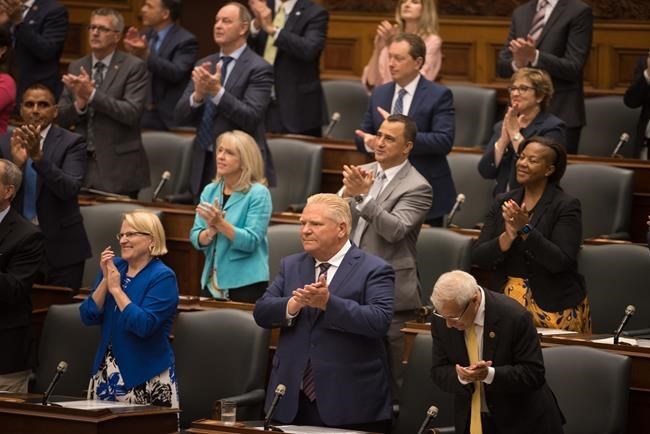TORONTO — More can be done to ease health system pressures in Ontario, Premier Doug Ford's throne speech acknowledged Tuesday, but no new solutions were offered to the problem that's led to temporary emergency room closures across the province.
Lt.-Gov. Elizabeth Dowdeswell delivered Ford's speech from the throne, which marks the start of a new legislative session, and it said the Progressive Conservative government is working with health-system stakeholders to identify ideas to tackle the issue.
Ford has been premier since 2018, and the speech touts what he has already done in health, including adding thousands of hospital beds and nurses, investing in home and community care, introducing a grant to attract health professionals to rural and remote areas, and planning to build 30,000 new long-term care beds.
"While these historic investments have helped to support the province’s health system through the most challenging period in modern history, there’s no question it, like health systems across Canada, continues to experience significant pressures, including an exhausted workforce and increasingly stressed emergency departments," Dowdeswell said.
"More can still be done. Your government is actively engaging with health-system partners to identify urgent, actionable solutions and will implement whatever measures are needed to help ease immediate pressures, while also ensuring the province is ready to stay open during any winter surge."
Emergency departments across Ontario have closed for hours or days at a time this summer, which stakeholders and advocates say is due to a nurse staffing crisis. Advocates have urged Ford to repeal public sector wage restraint legislation that he introduced in 2019, saying it is harming efforts to recruit and retain nurses.
Ford indicated through the speech that while working to address "short-term stressors," it will make long-term investments, such as how the government previously created Ontario Health Teams to integrate care and implementing a "Roadmap to Wellness" plan for mental health and addictions care.
"As the province continues to pursue these reforms, it will not be limited by conventional thinking that stifles innovation and preserves a status quo that struggles to respond to growing challenges and changing needs," the speech said.
"Instead, guided by the best evidence and the successes of other jurisdictions, your government will take bold action that prioritizes patients and their health above all else."
The throne speech also noted that – as promised during the election – the government will boost disability support payments by five per cent and tie future increases to inflation, and offered a new pledge to give an additional $225 million in direct payments to parents "to help their kids catch up."
The remarks opened by discussing a global "growing sense of uncertainty," amid COVID-19, high inflation, and the war in Ukraine, particularly its impacts on supply chains.
"Unprecedented spending throughout the pandemic has created new fiscal challenges here in Ontario and across Canada that will require prudent economic management in the months and years to come," the speech said.
"Taken together, these looming fiscal and economic challenges cannot be understated or ignored. They must be confronted head on. And there are no easy solutions."
The speech noted rising interest rates in response to high inflation and warned that Ontario, like the rest of the country, must be prepared for the possibility of a near-term economic slowdown.
Ford pledged through the speech to chart a path forward based on economic growth, "not painful tax hikes or spending cuts."
"Your government will continue to do what has served this province’s economy so well: cut red tape, keep taxes low, foster an environment that attracts global capital and make targeted investments that strengthen Ontario’s competitive advantage," the speech said.
It largely touted key parts of Ford's agenda, including building highways and other infrastructure, attracting electric vehicle manufacturing investment, and a skilled trades strategy that seeks to address a labour shortage.
Ford has indicated that a so-called strong mayor bill is coming to give the leaders of Toronto and Ottawa more power. The speech suggested that those powers will help get housing built more quickly.
"For urban populations, these new powers will be especially relevant as the province works with its municipal partners to expand the footprint of transit-oriented communities so more people can live, work and play near the convenience of public transit," the speech said.
This report by The Canadian Press was first published Aug. 9, 2022.
Allison Jones, The Canadian Press
